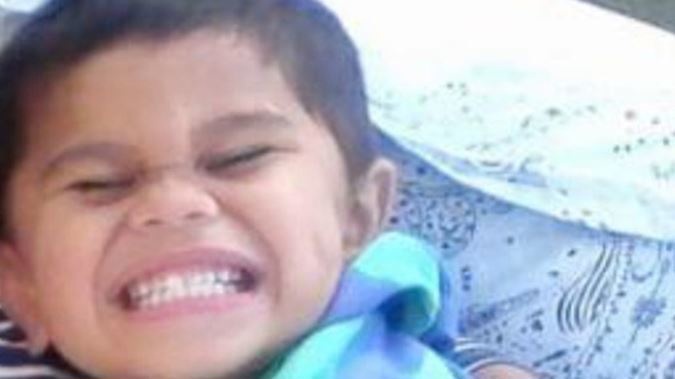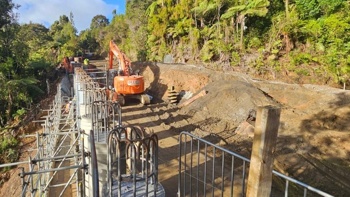
When Tania Shailer arrived at her new Housing New Zealand home in Taupo, with four children and a few basics, her new neighbour was sympathetic.
"When she moved in I felt sorry for her - a single mum, no car with four children all the way out here. She had just the basics and I thought she was new to this town. She spoke in soft tones and I thought she was a really nice girl. I know how hard it is to be a single mum with four children because I've been there for a little while, and I offered her 'if you ever need any help, just ask'."
There was nothing to indicate that two years later, Shailer and her partner David Haerewa would be at the centre of one of New Zealand’s worst child abuse cases following the death of Moko Sayviah Rangitoheriri, 3, in August 2015 from a prolonged and horrific period of beatings and abuse. This morning, Shailer and Haerewa, who were supposed to be caring for the toddler for the last two months of his life, were both sentenced to 17 years jail for manslaughter, downgraded from the original charge of murder.
MORE: Moko's killers get 17 years in prison
The idea that Shailer could have been involved in killing the child seemed unbelievable to Shailer's neighbour, a woman with children of her own, whose kitchen looks directly onto what was Shailer’s lounge window and front door - a ringside view.
Shailer and her four children aged one to seven, had moved to the Marshall Ave house from a safe house in Tauranga after David Haerewa was sent to jail. The younger three children were hers and Haerewa’s and the eldest was Haerewa’s child. The little family had few possessions at first and lived simply, but they seemed happy.
Located in the family-friendly suburb of Richmond Heights, although an inconvenient distance from the Taupo town centre, Shailer's sunny home was a quiet one - unusual with four young children - but nothing seemed untoward.
The neighbour, who spoke on condition of anonymity, says the Tania Shailer she saw was a good and a loving mother who sang and danced with her children. The curtains were always open and Shailer could often be seen cuddling with the children on the couch or they would be at the table, drawing and colouring in. There was no internet, no Sky TV, no Freeview even, but they would watch movies together on TV.
PHOTOS: March for Moko around NZ
She walked them to school and kindergarten every morning and back home, was a parent helper at the school and for at least some of the time in between was occupied with her NCEA studies at REAP, an adult education programme in Taupo's town centre.
The NCEA for Young Mums programme offered a group of other supportive young mothers and free childcare in the room next door for Shailer's one-year-old son. Interviewed in 2014 for a story for the local community newspaper about the programme, Shailer said she had heard about the programme via Family Start, a government funded service which supports family with high needs.
She was studying English, maths, history and home economics, wanted to complete her NCEA qualifications and study for a degree. She wanted to work in social services. She was thankful she was able to study with her baby so close. In the photograph, she is cradling a new baby belonging to one of the other young women, handling the newborn with an ease that clearly showed she was used to babies. The other women called her 'Tarnes'.
To the woman next door, Shailer was a neighbour rather than a friend, but a good one. There was no loud music or parties, no rowdy screaming kids. Sometimes she would come and ask for a ride into town - Shailer had no car - or an onion, some bread and butter, or a cup of milk. They 'got on the piss' a couple of times together, and if the neighbour's partner had caught a pig she would give Shailer some of the wild pork, but mostly they lived separate lives. She did not pay close attention but from what she saw, everything seemed fine.
A year after Shailer moved in, Haerewa arrived. Shailer had gone away for a holiday but she left a key with her neighbour and asked her to let Haerewa in. Later she rang again with another message for Haerewa, who had no phone of his own. He needed to go for a walk so that he would be out of the house when Shailer's sister dropped her off. She didn't want her family to know they were back together because they hated Haerewa. Haerewa returned before Shailer, but he hid in one of the bedrooms while Shailer's sister was around.
MORE: Hundreds seek justice for Moko around NZ
Haerewa, who lived at Marshall Ave for a year, was quiet too, the neighbour says. He would sometimes walk the children to school, and he had to report in regularly, presumably to the Probation Service, but apart from that, he sat in the house all day. Sometimes he would come over and borrow the axe to split firewood. He seemed okay, but there was something blank in his eyes.
One or both of them smoked dope - Haerewa used another neighbour's phone to call Shailer on the evening of Moko's death to say he'd hidden the weed in a nappy.
After Moko and his sister arrived, Shailer began asking her neighbour for help more frequently. It's how the neighbour first learned Shailer had Moko and his seven-year-old sister in her care.
"She sent a text saying 'hey bro, my cousin's just dropped her kids off with ****-all clothes. Do you have any clothes you don't want for the children?' I'd given all my young children's stuff away but I gave her shoes, a bag full of shoes and boots and that."
In the first week and a half after Moko and his sister's arrival, the neighbour saw Moko outside playing with the other children. After that, she never saw him again. That did not seem unusual as it was the middle of a cold Taupo winter.
Shailer's youngest was also kept inside, and with six children at the house, it was hard to keep tabs on which children were doing what. Not that the neighbour had any reason to. From what she saw, the children were happy and well-cared for. There was no shouting or yelling and the family seemed peaceful.
Moko's older sister went to school with the other children but Moko wasn't in early childhood education. Shailer had said it was because he was on the wait list, but the neighbour says she discovered later that the local kindergarten had offered him a place because of the family's circumstances. It was never taken up.
With hindsight the only unusual thing was the children's quietness. One night, Shailer asked her neighbour to give her and her daughter a lift to Taupo Hospital because the child had burned her arm on the fireplace. In the three hours they were at the Emergency Department, the child never said a word. She was also reluctant to get in the car, and then only on Shailer's lap. The children also mostly stayed inside.
The neighbour now wonders whether Haerewa was abusing Shailer.
"Thinking about it now, I wonder if they lived in fear. If they can take a baby's life, maybe they can threaten their own children.
"Before David moved in she was always on the couch with her kids, just loving and cuddling and kissing them. She used to sing with her babies all the time, but that stopped.
"I often wonder if David started inflicting the pain [on Moko] and encouraged her to do it because he didn't want to go down alone. I know she was lying about him living there so what else is she lying about? Is she taking the rap because she doesn't want him to go to jail for the rest of his life?"
On the day Moko died, the neighbour arrived home in the afternoon to see an ambulance in the driveway and Shailer sitting in it with the paramedics. The neighbour thought the ambulance had come for Shailer.
"David was standing there and the look on his face was worry, and I thought it was worry about his girlfriend."
She found out otherwise that evening when Shailer rang with a message for Haerewa.
"She said 'hey bro, can you take your phone over to David so I can talk to him? I said 'no, my phone's flat'. I said 'are you all right, is everything okay?' and she said 'yes, just at the hospital, Moko fell on wood and knocked himself unconscious'. I said 'I can get [my son] to run over and tell [Haerewa] something', and she said 'tell David the cops are coming'.
"It wasn't until I saw Senjo [Security] and the police and CYFS taking the kids out of David's hands at about 10.30pm that I knew something was up. They [the children] were screaming. That was their mum and dad."
When the neighbour heard Shailer had been arrested after Moko's death, she couldn't believe it.
"I was very, very, very sorry for the baby but I defended her right up until the actual thing came out that she was biting and kicking on him, and then I felt like a dick.
"Obviously someone killed him [Moko], but… I thought it was more him [Haerewa]…she just didn't seem like that sort of person. She was really good to my children too and for her to have raised someone else's child [Haerewa’s oldest child] as her own, there must have been a decent person in there at some stage."
The neighbour says she's aware she and others who lived near the Shailer/Haerewa family have been criticised on social media - that people believe they should have seen something, should have suspected a child was being horribly abused nearby. But there was nothing - no crying, no shouting, no loud noises or distressed or bruised children - nothing out of the ordinary which might have tipped them off.
But she says she feels a deep sense of guilt and grief that an innocent child was being beaten to death only metres away from her own home and would have intervened, had she only known.
"It breaks my heart to know that they were torturing him to death right next door. It breaks my heart to know that he was dying slowly right there. I feel ***ing bad, I have the guilt because we heard nothing. I just thought they were everyday normal average people - you never expect to be living next door to something like that. Ever."
Take your Radio, Podcasts and Music with you









